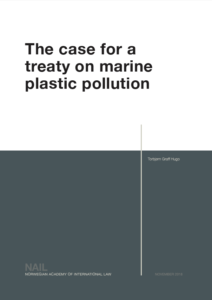The call for a new international treaty on marine plastic pollution is growing in strength. Scholars and civil society actors are now calling for a global regulatory framework to be put in place. At the first session of the open-ended ad hoc expert group on marine plastic litter and microplastics, held on 29–31 May 2018 in Nairobi, Kenya, an increasing number of States clearly articulated the need for such a treaty.
Proponents of a new legally binding instrument argue that a treaty would establish an important global meeting place for dedicated discussions about marine plastic pollution, and that it could help stem the tide of harmful plastic production and pollution, improve coordination, facilitate resource mobilization, and build synergies between existing initiatives and regimes. It has also been pointed out that a new treaty could help ensure continuity, harmonize monitoring and reporting, and that it could serve as an important tool for national policymaking.
These arguments have not yet convinced everyone. Some States have questioned whether a new treaty has merit at this point in time, and whether it might instead be more effective to channel the energy and resources of the international community into strengthening existing initiatives, instruments and structures. It has been pointed out that a new treaty could take a long time to put in place and even longer before it is implemented. Given the urgency of the problem, this has led some to conclude that more immediate and tangible measures should be prioritized.
The purpose of this policy paper is to contribute to the ongoing debate about the merits of a new treaty by exploring and expanding, in a structured manner, some of the arguments that have been made in favour of the new treaty. The paper starts with a description of the problem, followed by an assessment of its root causes and why it has not already been solved. Section 4 outlines a set of possible elements for a new treaty, while the final section provides a brief discussion about feasibility and the way forward.
Summary points
- Plastic pollution in the world’s oceans is at record levels and rising by the day. Unless urgent action is taken, the problem will get progressively more severe over the coming decades. Plastic litter is already harming many marine species and is likely to have an impact on human health in ways we do not yet fully understand. For a large number of States it is also having a direct economic impact.
- Pollution from land-based activities is by far the biggest source of the problem. The trend is linked to a steep growth in the total global production and consumption of plastic in recent decades combined with insufficient waste management infrastructure. But most critically, there has been a lack of political urgency about the problem, which has caused a severe deficiency in the capacity to collect and safely manage all plastic waste. The absence of a dedicated global governance structure has left an accountability gap in the global management of plastic pollution. This is a fundamentally transboundary question that epitomises the very reason why international law exists.
- A new international legal instrument is required to overcome the “commons dilemma” of marine plastic pollution. Such a treaty should outline a clear vision, stipulate global reduction targets and include a convincing plan for how to achieve those targets. These measures should include specific restrictions on production of certain plastic products. Such measures should be reinforced by a robust system for monitoring progress and a cooperative implementation support architecture.
- Calls for a new legally binding treaty to tackle marine plastic pollution have been growing in strength. The urgency of the problem, combined with a recognition of the ineffectiveness of existing fragmented responses, underline the need for negotiations on a new treaty to start as soon as possible. The mandate for such negotiations should be adopted at the next UN Environment Assembly to be held in Nairobi in March 2019.
